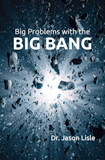A Big Belief
Most scientists believe that the universe suddenly appeared 13.8 billion years ago in an event called the big bang. Today, the universe appears to be expanding, so if the big bang model were true, the universe would have been much smaller in the very beginning.
In addition, if the big bang were true, that would mean (according to secular astronomers) that at the beginning, the universe would have been much hotter than it is today. According to the big bang model, this hotter temperature in the early universe ought to have produced a radiation field that continues to fill the universe today.
Fifty years ago, two astronomers discovered a radiation field (in the microwave part of the spectrum) that appears to fill the universe. We call this the “cosmic microwave background,” or simply, the CMB. Since the big bang model predicted something like the CMB, its discovery has long been hailed as “proof” of the big bang model of the universe’s origin. This is why most scientists today accept the big bang idea.
Both the cosmic microwave background and the big bang model are fraught with problems.
Both the CMB and the big bang model, however, are fraught with problems. For instance, different parts of the CMB have precisely the same temperature, though there is no reason why this should be so. We call this the “horizon problem,” and it amounts to a light-travel time problem for the big bang model. More than 30 years ago, cosmologists suggested that right after the supposed big bang, the universe briefly underwent a very rapid expansion, an expansion far faster than the speed of light. This cosmic inflation supposedly solves something called the “flatness problem” and several other problems for big bang proponents. Nearly all cosmologists and astronomers believe in this sort of expansion, called inflation, though there has been no evidence for it.
In March a team of astronomers announced that they had discovered the first evidence for cosmic inflation.1 This discovery, too, was hailed as the latest great proof of the big bang model, but not all scientists are convinced.
Some Christians see the hand of God in the big bang model, suggesting that the big bang was God’s method of creation. Some of them even claim that the Bible mentions the big bang and cosmic inflation, and have chided Answer in Genesis for failing to see this. Even more important than its many scientific problems, the big bang model does not square with Scripture. For instance, the big bang model supposes that the earth did not come into existence until nine billion years after the beginning. But the biblical account of creation has the earth being created on the first day of the Creation Week about 6,000 years ago (Genesis 1:1–2).

Furthermore, the big bang model requires that many stars existed for eight billion years or more prior to the earth, but we know from Genesis 1 that God made the stars on the Fourth Day, three 24-hour days after He made the earth. In addition, Exodus 20:11 tells us that God made the heaven and earth and all that is in them in six days, not over 13.8 billion years.
If we cannot trust the Bible about how the world began, then how can we trust it with regard to the virgin birth and our eternal destiny?
Why is proper belief about the origin of the universe so important to Christianity? If we interpret the creation account in terms of man’s current ideas about the origin of the universe and claim that this is what the Bible taught all along, then when scientists change their minds about how the world began (and they do tend to, at least every few decades), the Bible itself would be discredited. Ultimately, this is a question about scriptural authority and reliability. If we cannot trust the Bible about how the world began, then how can we trust it with regard to the virgin birth and our eternal destiny?
Creation really is about Jesus Christ, because He, as the Word, was present at the creation, was with God and was God, and all things were made by Him (John 1:3; Colossians 1:16). But it doesn’t end there. The Word became flesh and dwelt among men, and ultimately died on the Cross and rose from the dead to pay the penalty of our sins. Biblically, it is tragic to have the wrong view of creation. But infinitely more tragic is the failure to receive God’s free gift of salvation by grace through faith in the finished work of Jesus Christ—the Creator!
Footnotes
- This evidence is a subtle pattern of different directions of vibration imprinted on the CMB. Even some secular scientists have pointed out that these patterns are difficult to measure, and, if real, they could have been caused by several other mechanisms besides inflation. Others cautioned that the discovery announcement may be premature. For more information, see “Has Cosmic Inflation Been Proved?”
Recommended Resources

Answers in Genesis is an apologetics ministry, dedicated to helping Christians defend their faith and proclaim the good news of Jesus Christ.
- Customer Service 800.778.3390
- Available Monday–Friday | 9 AM–5 PM ET
- © 2026 Answers in Genesis




